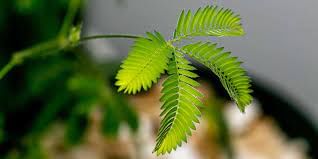Class 10 Science Chapter 6 Question Answers - Control and Coordination
Select the Correct Alternative:
Q1. ______ is the complimentary system of nervous system.
- Circulatory system
- Endocrine system
- Lymphatic system
- Skeletal system
Q2. Plant hormones are called ______.
- hypohormones
- metahormones
- phytohormones
- cytohormones
Q3. The leaves of mimosa are sensitive to ______.
 Mimosa Plant
Mimosa Plant
- light
- touch
- heat
- smell
Q4. A sunflower plant bends towards the sun. It is ______ response.
- Thigmonastic
- seismonastic
- thermonastic
- photonastic
Q5. All multicellular organisms, except ______, have well-developed nervous system.
- porifera
- mammals
- arthropoda
- insecta
Q6. Nerve mass in invertebrates is called ______.
- brain
- neuron
- ganglion
- pelvis
Q7. Hormones are secreted by ______.
- endocrine glands
- blood
- midbrain
- liver
Q8. The space between meninges is filled with ______.
- lymph
- blood plasma
- cerebrospinal fluid
- ACTH
Q9.______ is not the part of hind brain.
- cerebellum
- pons
- medulla oblongata
- cerebrum
Q10.______ protects spinal cord.
- Cranium
- Vertebral column
- Skull
- Ribs
Q11.______ pairs of spinal nerves arise from spinal cord.
- 21
- 31
- 32
- 42
Q12. Which of the following organs is not controlled by autonomous nervous system ?
- Heart
- Uterus
- Glands
- Eyes
Q13. The effects of sympathetic and parasympathetic nervous systems are ______.
- complimentary
- contradictory
- complimentary and contradictory
- none of above.
Q14. Endocrine glands ______.
- secrete plasma
- secrete nutrients
- secrete hormones
- secrete antibodies
Q15. Acetylcholine ______.
- increases the speed of conduction of impulses
- decreases the speed of conduction of impulses
- quickens the effect of growth hormones
- controls pituitary gland
Q16.______ is called the master gland.
- Pineal
- Pituitary
- Thyroid
- Thymus
Q17.______ hormone regulates ionic balance.
- Vasopressin
- Thyroxin
- Glucagon
- Testosterone
Q18.______ is the hormone responsible for development of female characteristics.
- Adrenalin
- Testosterone
- Thyroxin
- Progesterone
Q19.______ is responsible for lowering glucose level in blood.
- Glucagon
- Oxytocin
- Insulin
- Adrenalin
Q20.______ is responsible for increasing glucose level in blood.
- Glucagon
- Oxytocin
- Insulin
- Adrenalin
Q21.Prolactin regulates ______.
- blood pressure
- heartbeat
- mammary glands
- glucose metabolism
Q22. Nerve net is found in ______.
- sponges
- hydra
- earthworm
- cockroach
Q23.Which multicellular organism lacks the nervous system ?
- Hydra
- Locust
- Sponges
- Tapeworm
Q24. Which hormone functions as a growth promotor ?
- Auxin
- Ethylene
- Abscisic acid
- Both B and C
Q25.Which of the following shows thigmonastic response ?
- Sun flower
- Insectivorous plants
- Lotus
- Bryophyllum
Q26.Which two organs are connected by pons with the help of transverse band of nerves ?
- Nerves of brain and spinal cord
- Both the cerebral hemispheres
- Cerebellum and central nervous system
- Sympathetic and parasympathetic
Answers
- B
- C
- B
- D
- A
- C
- A
- C
- D
- B
- B
- D
- C
- C
- A
- B
- A
- D
- C
- A
- C
- B
- C
- A
- B
- C
|
80 videos|662 docs|80 tests
|
FAQs on Class 10 Science Chapter 6 Question Answers - Control and Coordination
| 1. What is Control and Coordination in Class 10? |  |
| 2. What is the role of hormones in Control and Coordination? |  |
| 3. What are the different types of receptors in the human body? |  |
| 4. How does the nervous system control body movements? |  |
| 5. What is the difference between a reflex action and a voluntary action? |  |

















